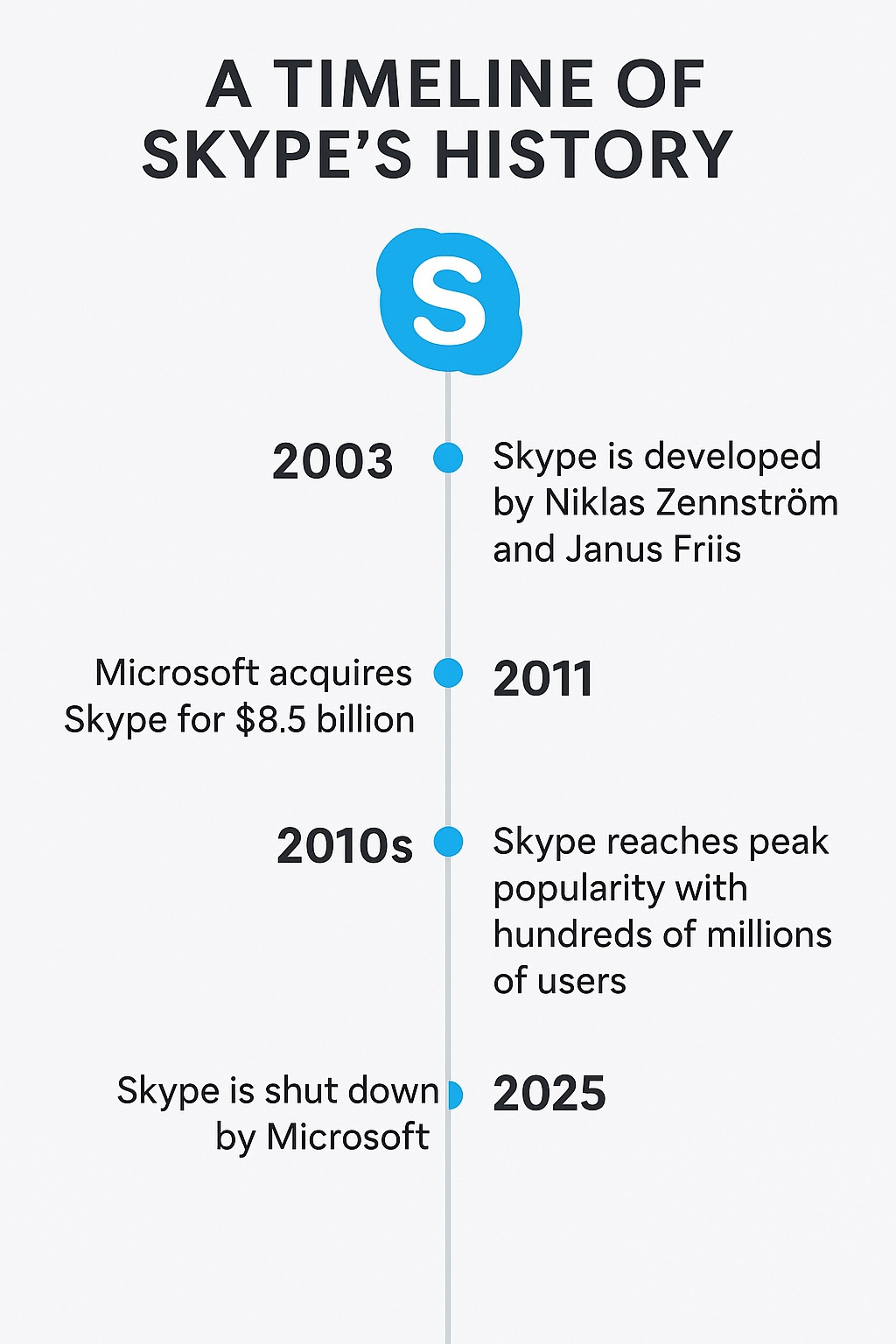End of an Era: Microsoft Officially Shuts Down Skype After Two Decades
Date: May 6, 2025
By Nitesh Patil
In a significant move marking the end of an era in digital communication, Microsoft has officially shut down Skype, the once-dominant video calling and VoIP platform that helped shape the early 21st-century internet landscape.
After more than 20 years of operation, Skype has been officially retired in favor of Microsoft Teams and other modern collaborative tools. This announcement follows a steady decline in its user base, years of strategic shifts, and fierce competition from newer platforms.
---
The Birth of a Communication Giant
Skype was founded in 2003 by Niklas Zennström and Janus Friis, developed by Estonian engineers Ahti Heinla, Priit Kasesalu, and Jaan Tallinn. Launched during the early boom of peer-to-peer (P2P) file-sharing technologies, Skype pioneered voice-over-IP (VoIP) communications for the masses. Its ability to offer free voice and video calls over the internet revolutionized personal and business communications.
Originally intended as a decentralized P2P calling software, Skype gained rapid popularity for its clarity, affordability (free calls over the internet and low-cost international calls), and user-friendly interface.
---
Golden Years: The Peak of Skype
Between 2005 and 2010, Skype experienced explosive growth. By 2011, it had more than 170 million active users globally and accounted for a significant share of all international calling minutes. It had become the go-to solution for families, freelancers, global businesses, and even small-scale media broadcasters.
In 2005, Skype was acquired by eBay for $2.6 billion, before being sold to a group of investors and later purchased by Microsoft in 2011 for a staggering $8.5 billion—a testament to its then-imperial status.
---
The Beginning of the Decline
While Microsoft's acquisition was initially seen as a strategic move to enhance its communications portfolio, it also marked the start of Skype’s long decline. The following factors contributed to its downfall:
1. Technical Overhaul Failures: Microsoft replaced Skype’s robust P2P backend with Azure cloud infrastructure, leading to performance issues, bugs, and outages.
2. Inconsistent UI/UX: Frequent design changes alienated loyal users, particularly as it tried to compete with mobile-first platforms.
3. Delayed Mobile Optimization: Skype was slow to adapt to the smartphone revolution. Apps like WhatsApp, FaceTime, and Zoom capitalized on this.
4. Rise of Competitors: Zoom, Google Meet, Slack, and Teams offered sleeker, faster, and more integrated experiences.
5. Lack of Focus: Skype aimed to be everything—chat, voice, video, business tool—but never truly excelled in any one domain post-2015.
Despite attempts to revamp it and re-market it for businesses, the competition had already taken over. By 2023, Skype’s monthly active users had dropped below 20 million—a fraction of Zoom’s or WhatsApp’s numbers.
---
The Final Curtain and Microsoft's New Direction
In a blog post on May 5, 2025, Microsoft announced the official discontinuation of Skype. Existing users will be given until July 31, 2025, to export chat histories and contacts. Post that, all services will cease completely.
“Skype served as a cornerstone of internet communication for over two decades,” said Jeff Teper, President of Microsoft 365. “But today’s communication needs demand more integrated, secure, and AI-powered platforms.”
Microsoft is urging users to transition to Microsoft Teams, which has been revamped into two tiers:
Teams for Work (businesses and enterprises)
Teams for Life (personal users, families, students)
Unlike its clunky earlier versions, the new Teams platform integrates real-time collaboration, messaging, cloud file sharing, and advanced AI meeting tools—effectively rendering Skype obsolete in Microsoft’s ecosystem.
---
Legacy and Lessons
Skype's story is a classic example of tech evolution: how an innovative product can lose its edge when it fails to adapt swiftly to changing user behaviors and competition. Despite its fall, Skype holds an indelible place in internet history—one that introduced millions to the power of internet calling and brought the world a little closer together.
As digital communications continue to evolve, Skype’s legacy will live on—not just in nostalgia, but in the foundation it laid for what we now take for granted: seamless global connection.
